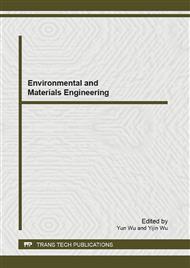p.566
p.574
p.578
p.584
p.590
p.596
p.600
p.605
p.609
Thermal Degradation and Microhardness Analysis of Polyene with Modified Oil Resin
Abstract:
Thermal degradation of polyene synthesized from recycle polyvinyl chloride (PVC) and hardness of polyene coated with modified oil has been studied by thermogravimetric analysis (TGA) and microhardness test. The synthesized polyene from reaction of recycle PVC were varied from 30 minutes, 1 hour, 2 hours and 4 hours and their thermal stability has been analyzed. From differential thermal gravimetric, DTG curve, polyene from two hours reaction showed the highest degradation temperature up to 445°C due to degradation of polyene sequences. Microhardness test performed by Shimadzu DUH 211/DUH-211S dynamic ultra microhardness tester according to ASTM E384 showed that polyene derived from 2 hours PVC with modifed oil resin resulted in the highest microhardness ~ 107.99 MPa.
Info:
Periodical:
Pages:
590-595
DOI:
Citation:
Online since:
February 2013
Price:
Сopyright:
© 2013 Trans Tech Publications Ltd. All Rights Reserved
Share:
Citation:


